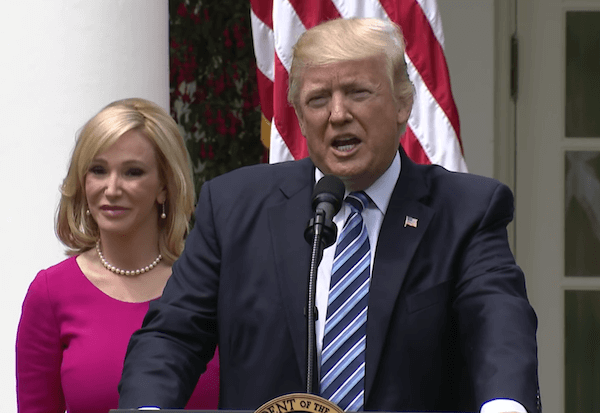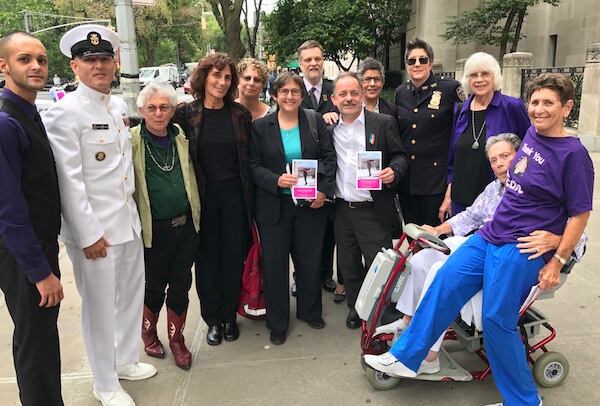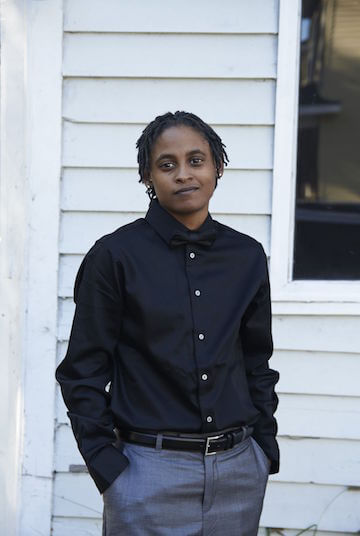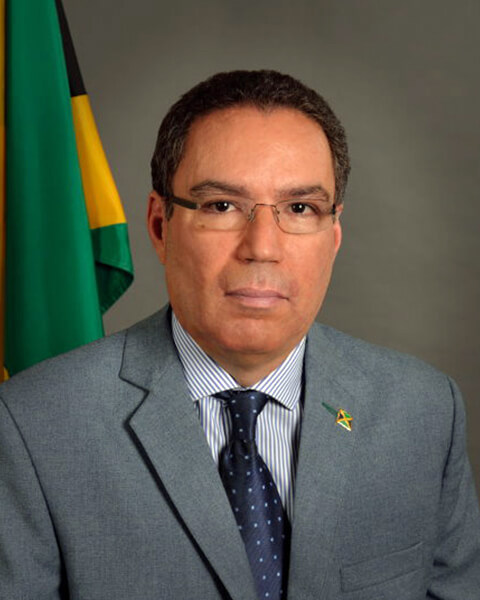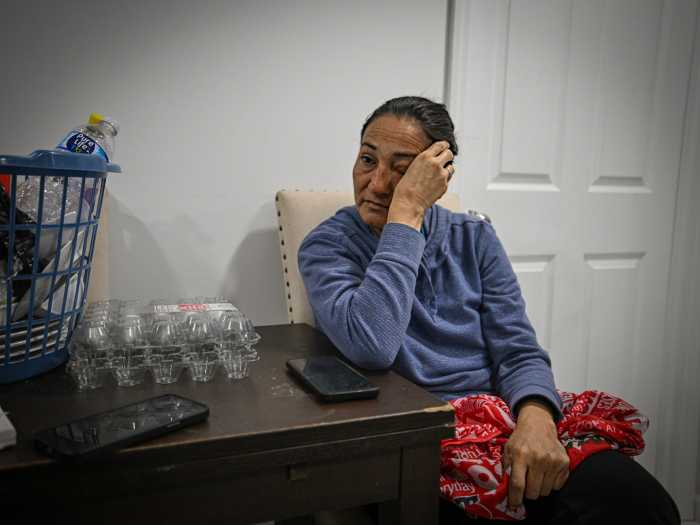Donald Trump at the May 4 Rose Garden ceremony signing an executive order on “religious liberty.” | WHITEHOUSE.GOV
BY PAUL SCHINDLER | For the second time in his young presidency, Donald Trump has pulled his administration back from an expected executive order explicitly providing sweeping religious exemptions for those wishing to discriminate against the LGBTQ community.
“Today’s executive order signing was an elaborate photo-op with no discernible policy outcome,” Anthony D. Romero, the out gay executive director of the American Civil Liberties Union (ACLU), said in a written statement issued shortly after Trump’s May 4 Rose Garden ceremony attended by conservative religious leaders, including a group of Roman Catholic nuns. “After careful review of the order’s text we have determined that the order does not meaningfully alter the ability of religious institutions or individuals to intervene in the political process. The order portends but does not yet do harm to the provision of reproductive health services.”
Two days earlier, Politico had reported that two senior White House sources told the news site that the president would issue an order with more teeth, a story that alarmed not only LGBTQ advocates but also women’s health proponents concerned that basic services, including reproductive health and contraceptive access, could be denied by religiously-affiliated – and perhaps, as well, family-held for-profit – institutions.
An unnamed religious conservative told Politico that they had seen the executive order and “the language is very, very strong.”
That report sparked fear that an executive order along the lines of a draft leaked to The Nation magazine in early February was in the offing.
In a press call on May 3, Sarah Warbelow, legal director at the Human Rights Campaign (HRC), warned that such an order would allow a potentially wide array of organizations receiving federal funding to claim a religious objection to providing services to LGBTQ people and afford employees of the federal government and of organizations doing business with the government special religious rights that might exempt them from nondiscrimination requirements in doing their job.
On the same call, Brigitte Amiri, a senior staff attorney in the Reproductive Freedom Project at the ACLU, said that under such an order any health care provider, including hospitals and universities, would be free to deny the services guaranteed under the Affordable Care Act’s women’s preventive care provisions, including access to contraceptives.
Both Amiri and Warbelow emphasized that religious objections to single parents raising children and couples living together outside of marriage would also be privileged under the February draft.
What Trump did, instead, was to assure religious conservatives that his administration would do everything it could under existing law to protect religious organizations from any penalties – in particular, a challenge to their tax-exempt status – for engaging in political speech and to give health organizations the maximum flexibility in preserving their “conscience-based objections” to providing certain reproductive health services.
The New York Times is reporting that Trump assured the Rose Garden audience that “members of the clergy should be allowed to endorse candidates without fear that their churches will lose tax-exempt status,” but the language of the order does not appear to provide that guarantee.
One key provision in the order states, “In particular, the Secretary of the Treasury shall ensure, to the extent permitted by law, that the Department of the Treasury does not take any adverse action against any individual, house of worship, or other religious organization on the basis that such individual or organization speaks or has spoken about moral or political issues from a religious perspective, where speech of similar character has, consistent with law, not ordinarily been treated as participation or intervention in a political campaign on behalf of (or in opposition to) a candidate for public office [italics added] by the Department of the Treasury.”
The italicized language appears to preserve the existing limitation in the tax code on political endorsements by tax-exempt religious organizations.
During the 2016 campaign and since assuming office, Trump has repeatedly pledged to do away with the 1954 Johnson Amendment, written by then-Senate Majority Leader Lyndon B. Johnson, which codified the limitations on political activity by religious organizations claiming a tax-exempt status. His order yesterday does not purport to do that.
“President Trump’s prior assertion that he wished to ‘totally destroy’ the Johnson Amendment with this order has proven to be a textbook case of ‘fake news,’” the ACLU’s Romero said in his statement.
An online posting by the anti-gay National Organization for Marriage reflected the disappointment many on the religious right felt about Trump’s order.
“An executive order he signed today, while containing some helpful provisions for pastors and religious medical providers, falls far short of what is needed to protect people of faith from governmental persecution set in motion by the Obama administration,” the web posting stated. “Instead, he has punted the issue to the Department of Justice which, he says, will develop new rules to protect the religious liberty rights of people and groups. This is the second time that President Trump has backed away from signing a comprehensive order protecting religious liberty after LGBT groups complained about the proposed actions. We cannot accept this capitulation on such a critical issue and must fight back.”
Disappointment on the right, however, did not keep progressives from warning about what this latest executive order from Trump portends.
The ACLU was the most measured in its response.
“The directive to federal agencies to explore religious-based exceptions to healthcare does cue up a potential future battle, but as of now, the status quo has not changed,” Romero said. “What President Trump did today was merely provide a faux sop to religious conservatives and kick the can down the road on religious exemptions on reproductive health care services.
The Human Rights Campaign, in a fundraising appeal, raised stronger alarms.
“With a stroke of his pen, Donald Trump just issued an Executive Order directing Attorney General Jeff Sessions – a man who has denied LGBTQ people equality under the law – to seek a license to discriminate across all areas of the government,” HRC’s Warbelow said. “This order is incredibly alarming, particularly for millions of LGBTQ people and women across the nation, who are among those most frequently subjected to discrimination under the guise of religion. For years, anti-LGBTQ organizations have been trying to legalize discrimination under the guise of religion. Today, these groups are celebrating because Trump’s order could allow government contractors to decline to work with gay and lesbian couples on adoptions and other services. It could also allow federal employees to refuse services to those whose benefits depend on marriage equality.”
In a more calibrated written statement, Janson Wu, executive director of the GLBTQ Legal Advocates & Defenders, said, “The president’s declaration today is dangerous pandering to a small but vocal segment of his political base, and a disturbing sign that his administration aims to shift the longstanding balance between respect for all faiths and fundamental principles of non-discrimination and equality for all. This Order invokes ‘religious liberty’ as a license to undermine women’s access to contraception, and to chip away at the separation between church and state by promising churches and other houses of worship broader leeway on political lobbying – something the majority of Americans – including people of faith – oppose.”

